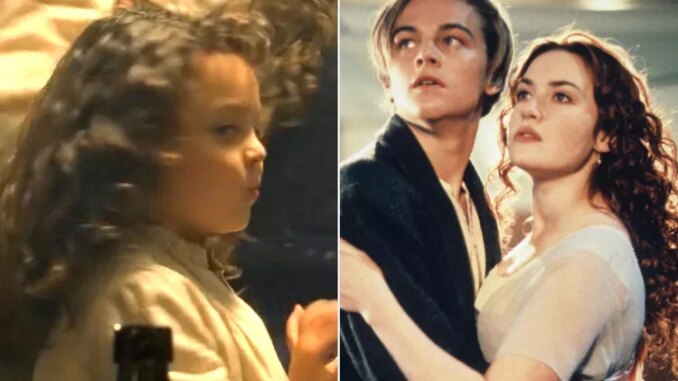
The chill of the Atlantic deep, the majestic silhouette of a ship destined for legend, and the vibrant, fleeting dance of human life upon its decks – James Cameron’s Titanic etched itself into the collective consciousness not merely as a disaster film, but as a poignant tapestry of love, class, and the brutal indifference of fate. Among its sprawling cast of characters, both historical and fictional, a tiny, effervescent beacon of innocence shone briefly: young Cora Cartmell. Her delight in dancing with Jack Dawson, her wide-eyed wonder at the grand ballroom, and her simple, unquestioning joy were quick brushstrokes on a vast canvas, yet they anchored a crucial thread of the film’s emotional fabric. And it is precisely this thread that brings us to a revealing insight from her young actress, a moment of cinematic omission that speaks volumes about the art of storytelling and the true weight of heartbreak.
Cora, portrayed by Alexandrea Owens, was a symbol. She represented the uncounted, the forgotten, the countless lives extinguished in the freezing waters – particularly the children, the third-class passengers whose very existence was considered expendable by the rigid social order of the time. Her brief, sunlit interaction with Jack, a shared moment of pure, unadulterated happiness before the impending doom, served to amplify the tragedy that would engulf them all. "I want to dance with Jack, Daddy!" she declared, her small hand reaching out, a hopeful gesture against the backdrop of an already doomed voyage. It was a fleeting whisper of normalcy and joy that made her inevitable fate all the more gut-wrenching, precisely because it was left to the audience's grim imagination.
But what if Cora’s story had been extended? What if the film had explicitly shown her end? It is here, according to Owens in subsequent reflections, that the true artistry of omission comes into play. While specific details of a removed scene involving Cora are not widely documented as a direct confession from James Cameron, the broader implications of such a decision align perfectly with the subtle power of Titanic. One can envision the raw, unedited footage: perhaps a final, frantic image of Cora's small face amidst the chaos, a heart-wrenching goodbye to her father, or even a silent, still shot of her after the plunge. Any of these would have been an undeniably devastating blow to the viewer.
The heartbreaking revelation, then, isn't about the content of the scene itself – which we can only speculate about in its unfilmed or excised form – but about why such a scene, in its potential visceral agony, was deemed too much. The prevailing theory, one that resonates with the careful crafting of cinematic emotion, is that showing the explicit death of a character as purely innocent as Cora would have been emotionally gratuitous. It would have tipped the scales from profound sadness to unbearable, almost exploitative, grief.
Imagine the film with such a moment included. The audience, already reeling from the mounting chaos, the screams, the sinking ship, and the unfolding tragedy of Jack and Rose, would be hit with an emotional hammer blow that might have alienated rather than engaged. Cameron’s brilliance lay in understanding that sometimes, the most powerful moments are those left unsaid, unseen, yet implicitly understood. The knowledge of Cora's probable fate, her absence in the film's latter half, is far more haunting than any direct depiction could be. Her story becomes a poignant symbol of the thousands of lives that were lost, not individually cataloged, but absorbed into the overwhelming enormity of the disaster.
The young actress's revelation, whether a direct quote about a specific cut scene or a later interpretation of Cameron's directorial philosophy, underlines a profound truth: the purpose of art is not always to show everything, but to evoke everything. By allowing Cora to simply disappear from the narrative, to leave her fate to the imagination, Cameron achieved a far deeper and more enduring heartbreak. Her small, innocent hand reaching for Jack, her joyful laugh in the face of oblivion, and then her silent, implied absence, serve as a constant, aching reminder of the true human cost of the Titanic – not just the famous lovers, but the countless Coras, whose fleeting moments of joy were snuffed out by an indifferent ocean, leaving behind only the echo of a forgotten dance. And in that powerful silence, the true tragedy of the unsinkable ship finds its most resonant voice.